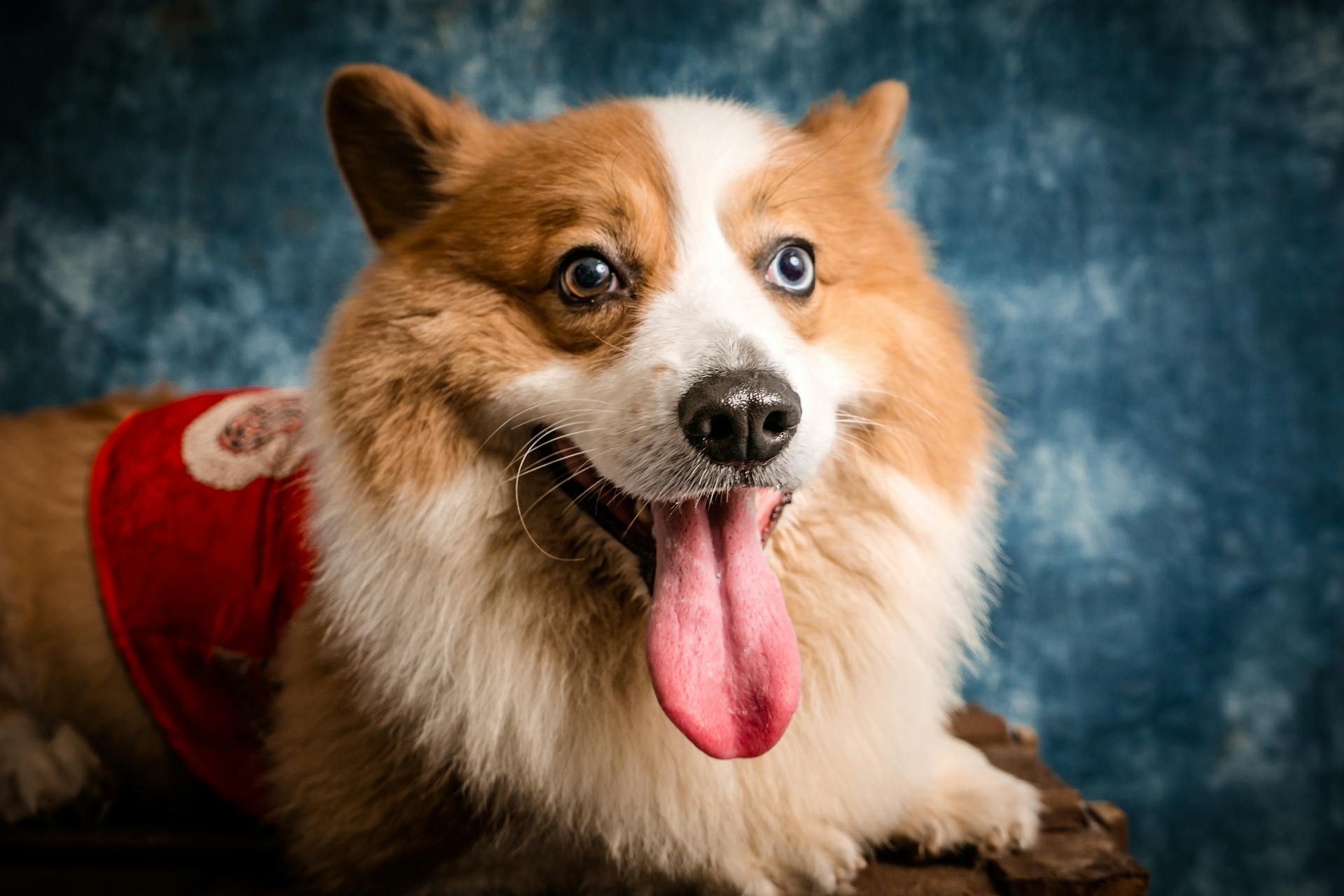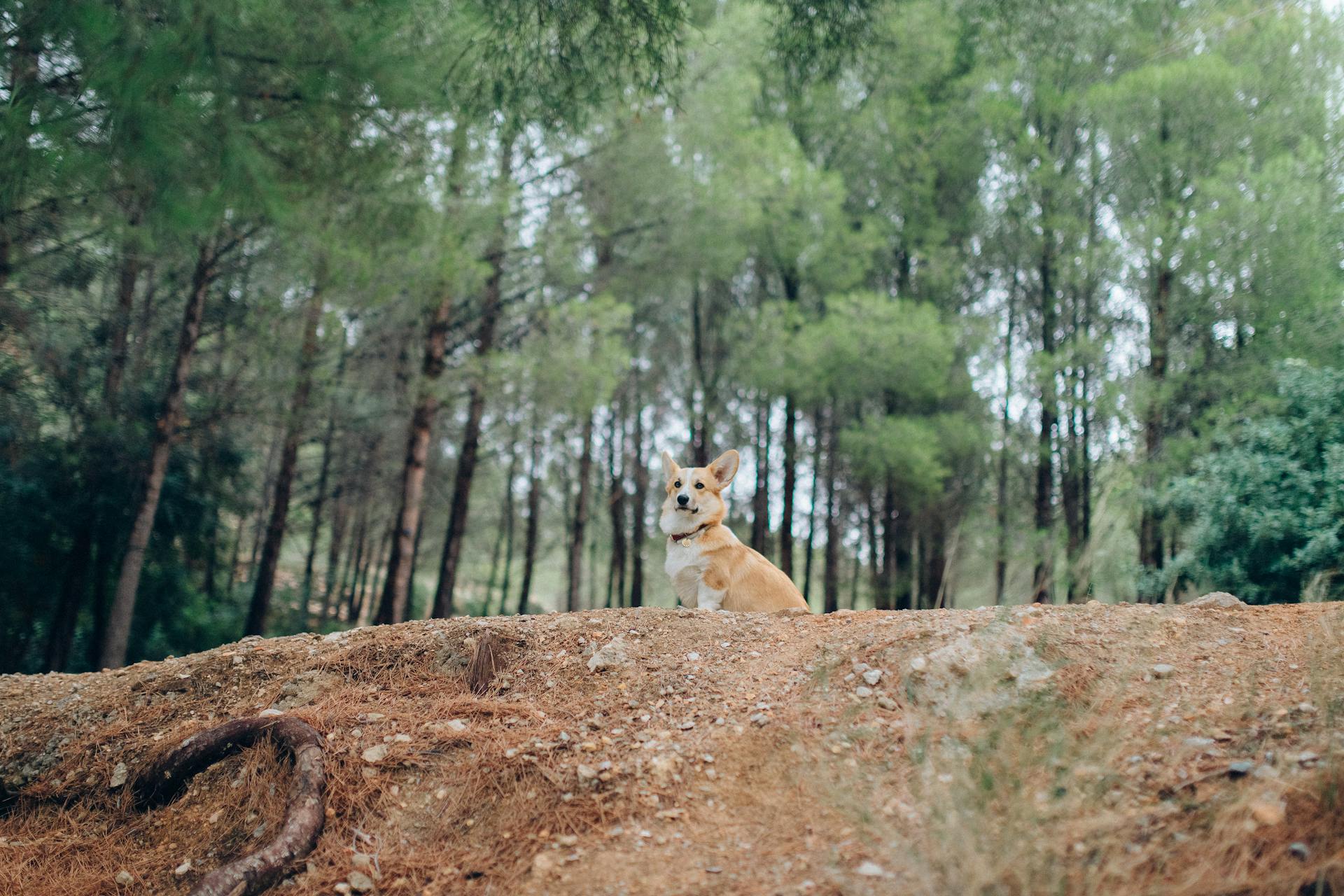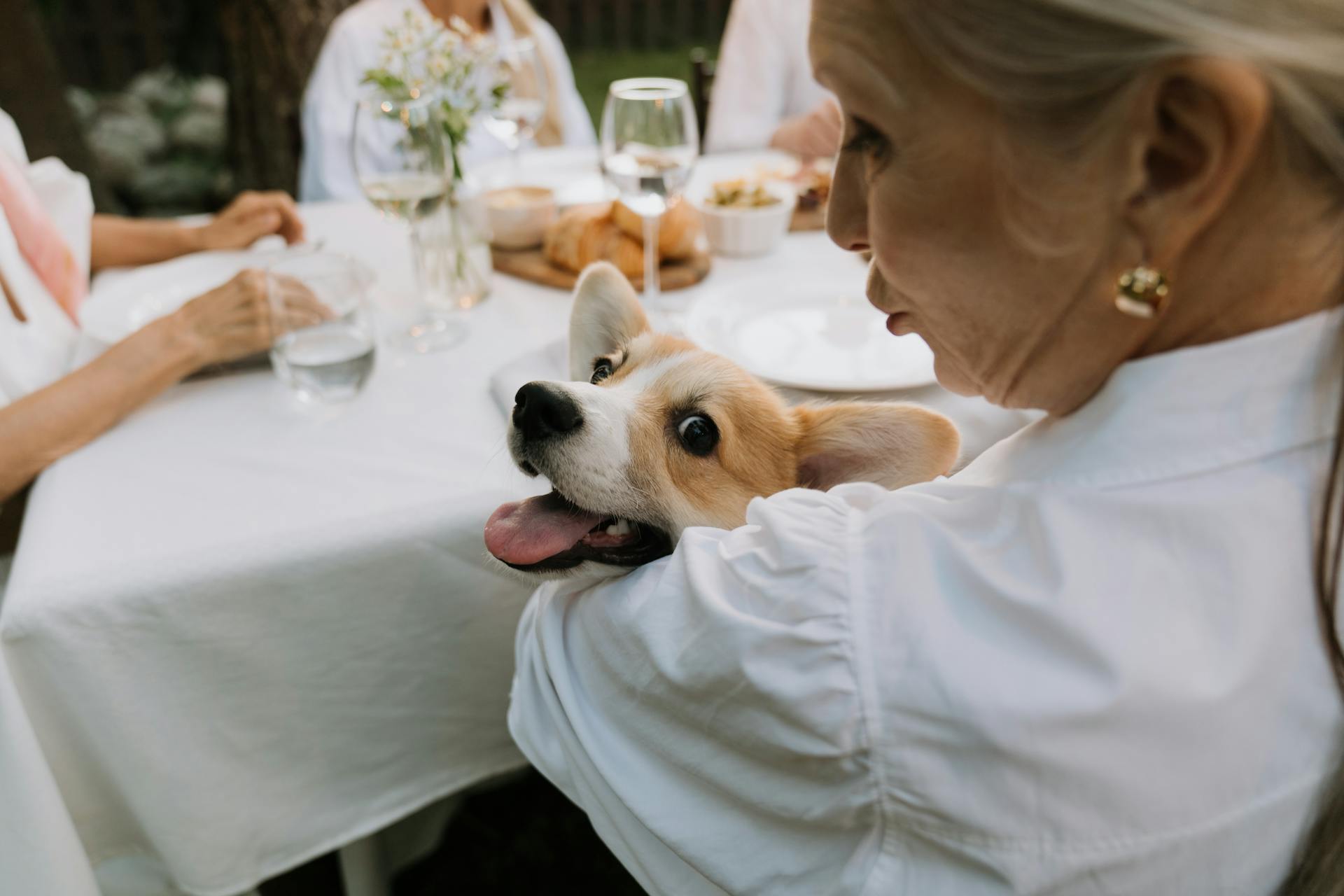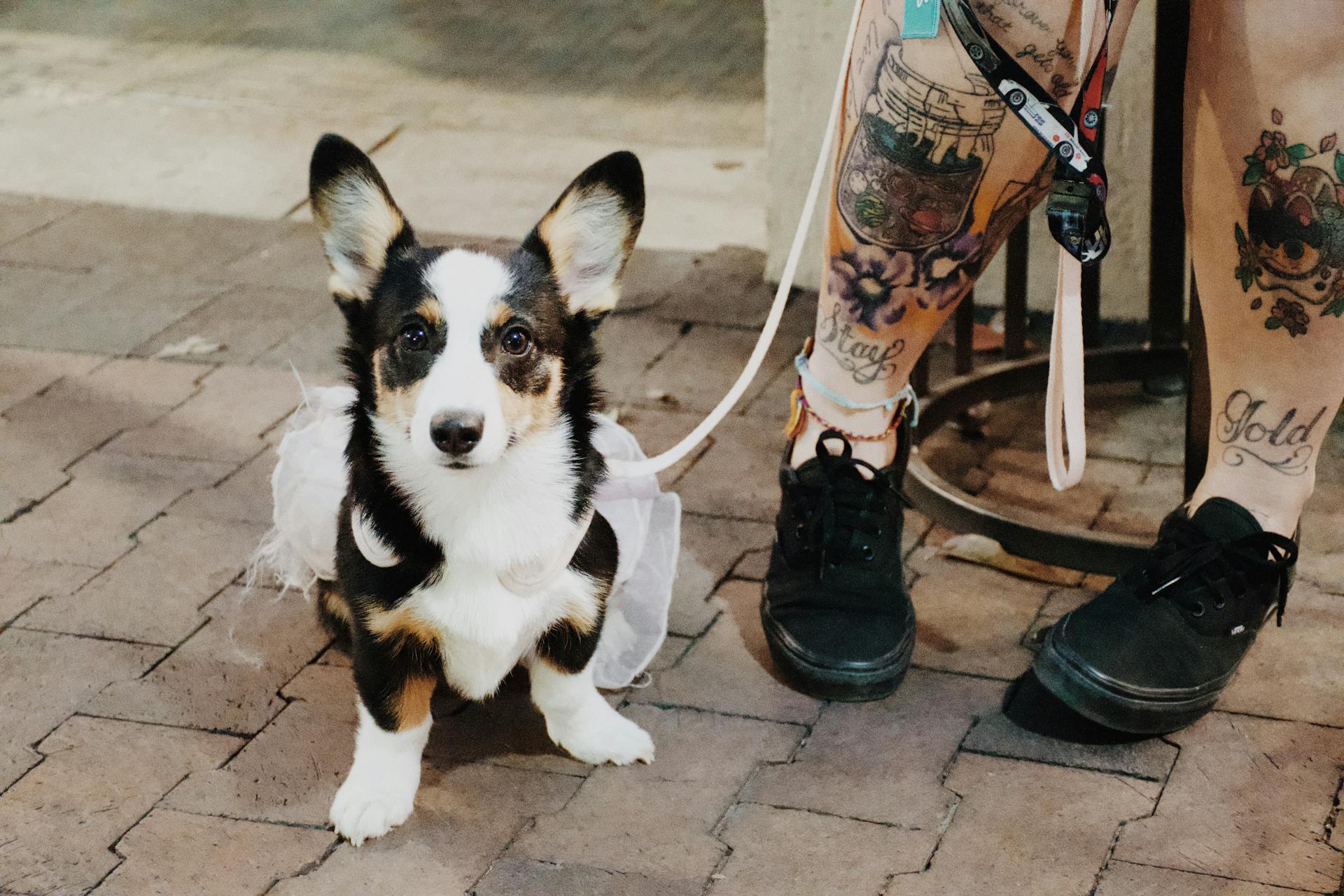
The Welsh Corgi is a beloved breed known for its intelligence and loyalty. They originated in Wales over 3,000 years ago.
Their early history is tied to herding cattle and horses, with evidence suggesting they were valued for their ability to nip at heels and move large animals.
One of the most distinctive features of the Welsh Corgi is its short stature, which averages around 10-12 inches in height.
Welsh Corgi Breed
The Welsh Corgi breed is a beloved companion for many dog owners. They belong to the Herding group and are known for their short stature, typically ranging from 10 to 12 inches in height.
Their weight can vary between 24 to 30 pounds, making them a relatively small yet energetic breed. With their coarse, medium-length double coat, they require regular grooming to prevent matting and tangling.
Pembroke Welsh Corgis come in a variety of colors, including red, sable, fawn, and tri-colored coats with white markings on their legs, chest, neck, muzzle, and belly. They are also known for their high intelligence and frequent barking, which can be both an asset and a challenge for owners.
In terms of exercise needs, Welsh Corgis require regular physical activity to stay happy and healthy. Their lifespan is typically between 12 to 14 years, making them a long-term companion for many families.
On a similar theme: Shiba Inu with Owner
Care and Maintenance
Pembroke Welsh Corgis require regular brushing to remove dead hair from their fur, ideally with 10-minute sessions once a week.
Their shedding can be managed by sticking to a brushing schedule. They are not hypoallergenic and shed moderately.
Bathing should occur every 6-8 weeks, depending on the dog's activities. Regular nail trimming is also necessary to prevent tears and overgrowth, typically every 2-3 weeks.
Weekly teeth brushing is essential for maintaining oral health.
Grooming & Care
Brushing your Pembroke Welsh Corgi weekly with a rubber curry brush is essential to remove dead hair from its fur.
Pembroke Welsh Corgis should have 10-minute brushing sessions at least once a week to fully remove loose hair.
Bathing frequency varies depending on your dog's activities, but a bath every 6 to 8 weeks is recommended.
This breed sheds moderately and isn't hypoallergenic, so regular brushing is crucial to minimize shedding.
Nail trimming should be done every 2 to 3 weeks to prevent tears and overgrowth.
Weekly teeth brushing is necessary for maintaining your Pembroke Welsh Corgi's oral health.
Pembroke Welsh Corgis typically don't have a strong odor, but they do require regular grooming to stay healthy.
Readers also liked: Welsh Corgi
Diet

Pembroke Welsh corgis do best on high-quality commercial dog food that meets the nutritional standards of the Association of American Feed Control Officials.
Choose a formula that fits your dog's stage in life - puppy, adult, or senior. Consult with your veterinarian to get their recommendation.
Corgis are prone to overeating and gaining weight, so it's essential to monitor their calorie consumption closely.
Only put the food bowl down at mealtimes instead of leaving it out all day for grazing. Be mindful of treat calories too - they count towards your dog's daily intake.
Most Pembroke Welsh corgis need 3/4 to 1.5 cups of high-quality dry food a day, usually divided into two meals.
Take a look at this: Are Border Collies High Energy
Temperament and Behavior
Pembroke Welsh Corgis love being around people and are known to get involved with their family.
They're active and bold, making them great companions for families who enjoy outdoor activities like long walks and agility training.
Corgis can be protective of their family and will alert them to any strangers or potential dangers.
However, they can also be cautious around new people and need early socialization and training to feel comfortable around unfamiliar faces.
Pembroke Welsh Corgis are highly intelligent and easy to train due to their strong work ethic and desire to please their owners.
They excel in activities like herding, tracking, and rally, and love to stay busy.
But be warned: if they don't receive enough exercise or mental stimulation, they may resort to digging or chewing on unwanted items.
Pembroke Welsh Corgis are great with children who know how to treat them gently and respectfully.
They'll often nip at heels in response to play, so it's essential to teach kids how to interact with dogs safely.
These short stacks can be dominant if not corrected, but they're generally wonderful companion animals for families of all ages.
However, they may try to herd their owners or other pets by nipping at their heels or feet, especially when they're excited.
Early socialization and training are crucial in curbing these herding instincts and teaching them to respect personal space.
Here's an interesting read: Are Border Collies Good for First Time Owners
Health and Longevity
Pembroke Welsh Corgis are known to live long, healthy lives, with an official lifespan between 12 and 15 years.
There have been numerous accounts of these dogs living up to 17-18 years, which is a testament to their overall health and well-being.
For another approach, see: Bull Terrier Back Then
Common Problems
Corgis can be prone to various health issues that affect their quality of life and longevity.
These adorable dogs are predisposed to von Willebrand Disease, a blood disorder that affects clotting.
Progressive Retinal Atrophy is another common eye problem that can lead to blindness in Corgis.
Hip dysplasia and back problems can cause pain and mobility issues for these lovable dogs.
Unfortunately, Corgis tend to become overweight if they're not fed a balanced diet and exercised regularly.
Lifespan
Pembroke Welsh Corgis are known to live long, healthy lives.
Their official lifespan is between 12 and 15 years, but many have been reported to live up to 17-18 years.
Curious to learn more? Check out: 100 Years Ago Original Boston Terrier
History and Origin
The Pembroke Welsh Corgi originated in Wales in the 1100s, and its name "corgi" means "dwarf dog", which accurately describes this breed.
It is believed that the Pembroke Welsh Corgis were introduced by Flemish weavers as a working dog. They brought their dogs with them to herding cattle and sheep, which became the breed's original purpose.
The breed has maintained a symbol of royalty with Queen Elizabeth II, who still keeps Pembroke Welsh Corgis within her sight at all times. This is likely due to its popularity among royal families, starting when King George VI gifted one to his daughters Elizabeth and Margaret in the 1930s.
In fact, the breed began to gain significant popularity in the 1930s, and it was officially recognized by the AKC in 1934.
History of the Breed
The Pembroke Welsh Corgi originated in Wales in the 1100s.
This breed is believed to have descended from spitz-type breeds brought to Britain with the Vikings, and its original purpose was to herd sheep by biting their legs.
The word "corgi" means "dwarf dog", which accurately describes this breed.
It's often debated how the Pembroke Welsh Corgi originated, but it's believed that Flemish weavers introduced them as a working dog.
In 1107, Henry I of Britain invited Flemish weavers to move to southwestern Wales, and they brought their herding dogs with them.
The two breeds, Pembroke Welsh Corgi and Cardigan Welsh Corgi, were once considered one breed but have been separate since the 1800s.
The American Kennel Club recognized the Pembroke Welsh Corgi in 1934.
This breed has maintained a steady popularity ranking within the AKC, although not as high as it used to be.
Famous
The Pembroke Welsh Corgi is a beloved breed with a rich history and a special place in the hearts of many royals, including Queen Elizabeth II.
She's particularly fond of this breed, which makes sense given their friendly and outgoing nature.
One notable characteristic of Pembroke Welsh Corgis is their small to medium size, typically ranging from 10 to 12 inches in height and weighing between 25 to 27 pounds.

This compact size makes them a great fit for families with smaller living spaces or those who want a low-maintenance pet that still requires regular exercise.
In fact, Pembroke Welsh Corgis need daily walks and some running and playtime to stay happy and healthy.
Here are some key facts about the breed's temperament:
These traits make Pembroke Welsh Corgis a great fit for active families or individuals who enjoy outdoor activities.
Despite their small size, they're also confident and outgoing with strangers, making them a great breed for social events or meetups.
Similar Breeds
If you're considering adopting a Pembroke Welsh corgi but want to explore other options, there are some breeds that might catch your eye.
The Rustralian Terrier is 100% similar to the Pembroke Welsh corgi, making it a great alternative if you're looking for a dog with similar characteristics.
Other breeds that share similarities with the Pembroke Welsh corgi include the Chinook, Norwegian Elkhound, Welsh Terrier, and Podenco Canario - all of which are 100% similar to the breed.
For another approach, see: Dogs Similar to Border Collies
Similarly Sized Breeds
If you're looking for breeds that are similar in size to the Pembroke Welsh Corgi, there are a few options worth considering.
The Petit Basset Griffon Vendeen is one such breed, with a 98% similarity in size to the Pembroke Welsh Corgi. This French scent hound has a sturdy build and a short, easy-to-maintain coat.
For those who want an even more compact companion, the Doxie-Pit might be a good fit, sharing a 95% similarity in size with the Pembroke Welsh Corgi. As its name suggests, this breed is a cross between a Dachshund and an American Pitbull Terrier.
If you're drawn to the playful, affectionate nature of the Pug, consider the Corgi Pug, which shares a 93% similarity in size with the Pembroke Welsh Corgi. This hybrid breed combines the best qualities of both parent breeds.
Alternatively, you might want to look into the Bullhuahua Terrier, another breed that matches the Pembroke Welsh Corgi's size at a 93% similarity. With its strong build and outgoing personality, this breed is sure to make a loyal companion.
Lastly, if you're open to exploring less common breeds, the Goldenshire might be worth considering, with a 92% similarity in size to the Pembroke Welsh Corgi.
Here are some similar sized breeds to consider:
- Petit Basset Griffon Vendeen: 98% Similar
- Doxie-Pit: 95% Similar
- Corgi Pug: 93% Similar
- Bullhuahua Terrier: 93% Similar
- Goldenshire: 92% Similar
Breeds Similar To
If you're considering a Pembroke Welsh Corgi but want to explore other options, there are several breeds worth looking into.
The Cardigan Welsh corgi is often confused with its smaller cousin, but it's actually a distinct breed with a similar energetic spirit and love of people.
Similar Maintenance Breeds to Pembroke Welsh Corgi include the Rustralian Terrier, Chinook, Norwegian Elkhound, Welsh Terrier, and Podenco Canario, all of which share 100% similarity.
If you're looking for a smaller dog like the Shiba Inu, consider that they're just as smart and fearless as Pembroke Welsh corgis, with a similar fox-like appearance.
Border collies are another option, but keep in mind they're quite a bit bigger than Pembroke Welsh corgis and require plenty of exercise to keep them happy and healthy.
Here's a list of breeds that share similarities with the Pembroke Welsh Corgi:
- Rustralian Terrier
- Chinook
- Norwegian Elkhound
- Welsh Terrier
- Podenco Canario
- Cardigan Welsh corgi
- Shiba Inu
- Border collie
These breeds all share some characteristics with the Pembroke Welsh Corgi, but it's essential to research and consider their unique needs and personalities before making a decision.
Frequently Asked Questions
Are Welsh Corgis good house dogs?
Yes, Welsh Corgis can thrive as loving house dogs with proper care and attention. They're loyal companions that bring joy to families who provide a suitable environment.
Are Welsh Corgis expensive?
Yes, Welsh Corgis are considered a relatively expensive breed, with prices ranging from $1,000 to $2,200. The cost is influenced by factors such as bloodline, color, and breeder expertise.
What is the difference between a corgi and a Pembroke Welsh Corgi?
There is no difference between a corgi and a Pembroke Welsh Corgi - they are actually referring to the same breed. However, Cardigan Welsh Corgis have distinct characteristics such as larger size and heavier bone structure compared to Pembrokes.
What breeds make up a Pembroke corgi?
Pembroke corgis are believed to be a dwarfed version of the Spitz family of dogs, specifically related to the Swedish Vallhund or Norwegian Buhund. Their ancestry is rooted in ancient herding breeds from Northern Europe.
What are the disadvantages of the Pembroke Welsh Corgi?
Pembroke Welsh Corgis may be prone to certain health issues such as hip dysplasia, eye problems, and genetic blood clotting disease. Responsible ownership requires regular veterinary check-ups to monitor their health and address potential problems early on.
Featured Images: pexels.com


